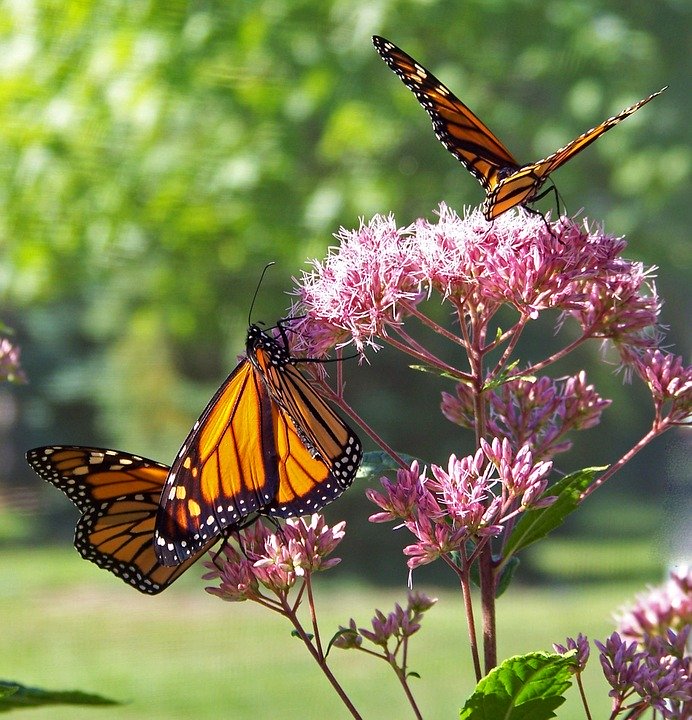17
Mar
Monarch Population, Under Threat from Pesticide Use and Habitat Loss, Declines by Half in One Year

(Beyond Pesticides, March 17, 2020) The number of monarch butterflies overwintering in Mexico is down 53% from last year, according to a count conducted by World Wildlife Fund (WWF) Mexico. While WWF indicates the decline was expected due to unfavorable weather conditions during the species southward migration, other environmental groups are raising red flags. “Scientists were expecting the count to be down slightly, but this level of decrease is heartbreaking,” said Tierra Curry, a senior scientist at the Center for Biological Diversity. “Monarchs unite us, and more protections are clearly needed for these migratory wonders and their habitat.”
WWF’s count found that monarchs occupied seven acres this winter, down from 15 acres last year. Reports indicate that 15 acres is a minimum threshold needed to prevent a collapse of the butterfly’s migration and possible extinction. This was the goal stated by the 2015 White House Pollinator Task Force, which the current administration is failing to see through.
While weather conditions play an important role in monarch migration from the U.S. and Canada south to Mexico, the species is under threat from a range of environmental factors. Monarchs depend on milkweed plants to lay eggs, and monarch caterpillars feed solely on these plants before metamorphosis. But the rapid spread of genetically engineered crops throughout the country has decimated the milkweed habitat on which the butterflies depend. According to research published in 2014, roughly 70% of all milkweed losses between 1995 and 2013 were located in agricultural areas.
Recent studies indicate that even when monarchs can find milkweed plants to lay their eggs, pesticide contamination from chemical intensive agriculture may be undermining their ability to continue their journey. A 2019 study found 14 different agricultural pesticides on milkweed tested near farm fields in Indiana, including the neonicotinoid class of insecticides implicated in the decline of pollinators. Research published late last year finds that monarchs that feed on neonicotinoid-contaminated milkweed experience a significantly shortened lifespan. Most monarchs (79%) exposed to neonicotinoids died within 22 days, while only one in five of those unexposed perished.
Monarch overwintering grounds are also threatened by habitat loss from illegal logging. Last month, two renown monarch activists who fought against illegal logging were murdered in the same week. Raúl Hernández Romero’s body was found inside a butterfly sanctuary in Ocampo, Mexico, while Homero Gómez González was found in a well. Both showed signs that they were attacked.
With the range of threats confronting this iconic species, it is a wonder that we still have some time to protect, and potentially save the species. The challenge is real; in the 1990s the eastern monarch population numbered nearly one billion butterflies. Counts from 2018 recorded only 93 million monarchs. Numbers are even more concerning for the western monarch. Cheryl Schultz, PhD, an associate professor at Washington State University Vancouver notes, “Western monarchs are faring worse than their eastern counterparts. In the 1980s, 10 million monarchs spent the winter in coastal California. Today there are barely 300,000.” Dr. Schultz’s research finds that western monarchs face an 86% risk of extinction within the next 50 years.
Legal experts are calling on the U.S. Fish and Wildlife Service to place monarchs under federal protection. “Both the law and science require that we must protect monarchs under the Endangered Species Act before it’s too late,” said George Kimbrell, legal director for the Center for Food Safety. “Monsanto’s profits cannot come before the monarch’s future.”
Help monarchs rebound by taking action. While many in the U.S. and around the world are currently in quarantine or lockdown due to the coronavirus, you can still make progress in protecting the environment. Take some time to prepare your garden for spring pollinators; plant organic seeds and starts and tell your state’s Governor to act. Work on those more detailed letters you’ve wanted write to your elected officials, urging them to support laws that would protect monarchs and other pollinators, like the Saving America’s Pollinators Act. And continue to connect and organize with you friends and neighbors virtually, through sites like Nextdoor and Facebook. For more information on the imperiled monarchs, see past Daily News articles and Beyond Pesticides’ BEE Protective webpage.
All unattributed positions and opinions in this piece are those of Beyond Pesticides.
Source: World Wildlife Fund Mexico; Center for Biological Diversity










